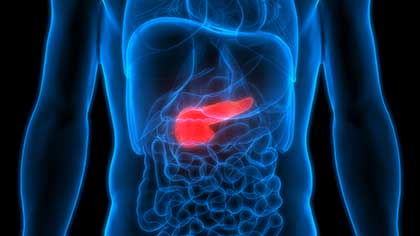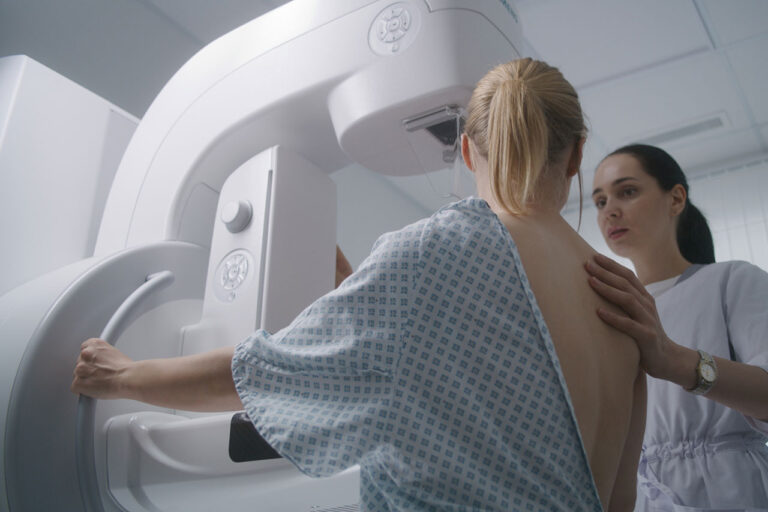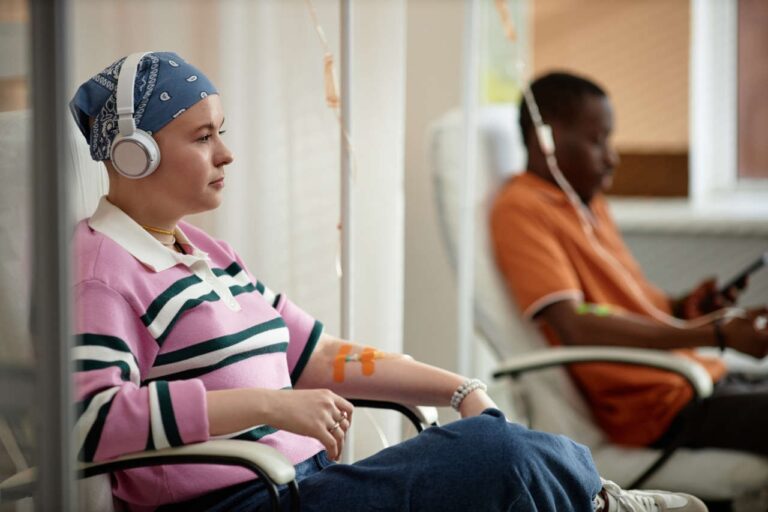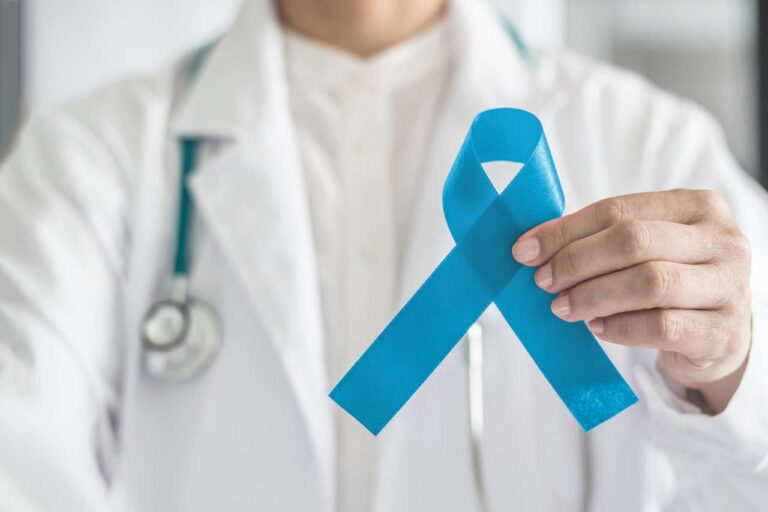
Sutent (generic name: sunitinib malate) is an FDA-approved brand-name prescription drug for the treatment of certain types of cancer including:
- Pancreatic neuroendocrine tumors, advanced
- Renal cell carcinoma, adjuvant treatment
- Renal cell carcinoma, advanced
- Soft tissue sarcoma, non-GIST
- Thyroid cancer, refractory
- Gastrointestinal stromal tumors
Speak to a Specialist About Copay Assistance
How Sutent Is Supplied
Sutent is a kinase inhibitor and contains the active ingredient sunitinib. Sutent is available in a capsule formulation and is available in the following strengths: 12.5 mg, 25 mg, 37.5 mg, and 50 mg doses. Sutent is typically administered orally once per day as directed by your doctor.
What Is Sutent Used To Treat?
The Food and Drug Administration (FDA) has authorized the use of prescription medications like Sutent to treat a wide range of illnesses and diseases, such as the types of cancers listed above. In addition, Sutent may be used for conditions not specifically mentioned on the product label.
Pancreatic Cancer
Sutent has been FDA-approved to treat neuroendocrine pancreas tumors (pNETs). pNETs begin in the cells of the pancreas that are responsible for insulin production. In order to use Sutent, pNETs must grow slowly and resemble normal cells, and they must also be incurable (irremovable via surgery). In addition, pNETs must be localized (close to the pancreas) or have spread to the other parts of the body (metastatic).
Efficacy Studies Against Pancreatic Cancer
A multi-center, international, randomized, double-blind, placebo-controlled study examined patients with unresectable pNETs. This study compared treatment between a Sutent therapy group and a placebo group. The goal of this study was to examine how long Sutent prevented pNETs from getting worse.
The results of this study were as follows:
- Sutent group: Half of Sutent patients did not see tumor progression for 10.2 months.
- Placebo group: 50% of the patients developed tumors after 5.4 months.
Adjuvant Therapy For Kidney Cancer
Patients who have undergone nephrectomy and have been diagnosed with localized renal cell carcinoma (RCC) are candidates for Sutent treatment. Sutent has been FDA-approved for RCC adjuvant therapy, to help reduce cancer recurrence after primary treatment has been completed.
Following a nephrectomy, some patients can be at a high risk of RCC recurrence.
A study has examined the ability of Sutent to prevent RCC recurrence. The results of this study were as follows:
- Sutent group: 50% of this group did not have cancer recurrence for 6.8 years.
- Placebo group: 50% of this group did see cancer recurrence after 5.6 years
Get Copay Assistance – Speak to a Specialist
Kidney Cancer
The advanced form of renal cell carcinoma, also known as kidney cancer, can be treated with Sutent. Renal cell carcinoma usually starts in tubule-lining cells. These tumors form when these cells cluster together into a group of cells. If a patient has advanced RCC, the cancer may have spread to other organs.
Efficacy Against Kidney Cancer
A study was completed in patients with untreated advanced RCC. Researchers compared the efficacy of Sutent and interferon-alfa.
Sutent’s ability to slow the progression of RCC was investigated in this study and the results were as follows:
- Sutent group: 50% of this group did not see cancer progression for an average of 47.3 weeks.
- Interferon-alfa group: 50% of this group saw cancer progression after 22.0 weeks.
Gastrointestinal Cancer

Gastrointestinal stromal tumors (GISTs) are rare digestive system cancers. They often begin in the digestive tract lining, most often in the stomach or small intestine. Tumors can also form in other parts of the digestive system.
When treating (GISTs), the drug Sutent may be prescribed if:
- Following treatment with a medication known as imatinib (Gleevec), the tumors have become more advanced, or
- The body is unable to tolerate imatinib.
Efficacy Against Gastrointestinal Cancer
A study examined GIST patients who stopped using imatinib. Researchers compared Sutent vs. placebo results.
The length of time that Sutent was able to delay the progression of the tumor was investigated.
- The tumors of approximately half of the Sutent patients did not progress for 27.3 weeks.
- The tumors of half of the people in the placebo group had grown after 6.4 weeks.
How Should Sutent Be Taken?
It is advised to take Sutent as directed by your physician or other healthcare providers. Sutent comes in the form of a capsule, which must be swallowed whole with a full glass of water. It is best if taken at the same time each day, either before or after a meal. It is not recommended to chew, cut or crush this medication as this can affect the metabolism of the medication.
Sutent Side Effects
Sutent does have some mild to severe side effects, as listed below.
Mild Side Effects
- Mild rash
- Changes in skin or hair color
- Hand-foot syndrome (swelling or redness in the feet or hands)
- Taste changes
- High blood pressure
- Mild sores and swelling in the mouth
- Digestive system problems, including decreased appetite, acid reflux, belly pain, vomiting, nausea, and diarrhea
- Fatigue or weakness
Some of the listed side effects may subside in days to weeks, but if symptoms worsen, it is important to see a doctor or contact your pharmacist.
Get Sutent Copay Assistance
Sutent Financial AssistanceSevere Side Effects
The severe side effects listed here are serious and may be life-threatening. Call 911 immediately if you experience any of the following symptoms below:
- Liver toxicity
- Allergic reaction with swelling of the face, throat, or tongue; trouble breathing; or passing out
- High blood pressure with the following symptoms:
- Vision problems
- Headache
- Chest pain
- Brain swelling caused by a condition known as reversible posterior leukoencephalopathy syndrome. Some of the symptoms include:
- Seizures
- Headaches
- Changes in vision
- Impaired wound healing, such as frequent infections or slow healing.
- Osteonecrosis (bone cell death) in the jaw. Symptoms can include:
- Infection
- Swelling
- Pain
- Low blood sugar. Symptoms can include:
- Trouble concentrating
- Blurred vision
- Confusion
- Change in heart rate or rhythm
- Sweating
- Thyroid hormonal changes such as hyperthyroidism and hypothyroidism. Symptoms can include:
- Change in menstrual periods
- Hair loss
- Sweating
- Loss of appetite
- Fatigue
- Racing heartbeat
- Stevens-Johnson syndrome and other life-threatening skin reactions. Possible symptoms are:
- Body or joint aches
- Bumps or sores
- Itching
- Purple or red rash with peeling skin or blisters
- Proteinuria (a lot of protein in the urine and possible damage to the kidneys). Symptoms may include:
- Swollen hands, feet, face, or abdomen
- Frequent urination
- Foamy urine
- Thrombotic microangiopathy (clots in the blood and damaged blood vessels). Symptoms may include:
- Confusion
- Producing less urine
- Fever
- Shortness of breath
- Fatigue
- Acute kidney failure
- Decreased number of red blood cells
- Tumor lysis syndrome (ailment brought on by cancer cells releasing poisons into the blood). Possible symptoms are:
- Abnormal heart rhythm
- Acute kidney failure
- Nausea
- Fatigue
- Muscle cramps
- Intestinal or stomach tears or holes, associated with pain in the belly area
- Heart problems including abnormal heart rhythm, high blood pressure, heart attack, and heart failure. Symptoms may include:
- Dizziness or feeling faint
- Swelling of feet or ankles
- Shortness of breath
- Bleeding problems. Some possible symptoms are:
- Painful, swollen belly
- Coughing up blood
- Blood in urine or stool
- Bleeding gums
- Nosebleeds
- Bruising easily
Speak to a Specialist
Sutent Dosage
There are a number of factors that will determine what Sutent dose your doctor recommends for you:
- Different medications that you’re currently using
- Other health issues that you may be experiencing
- The diagnosis that you will be taking Sutent for, and the severity of your condition
Pancreatic Cancer Dosage
When treating advanced pancreatic neuroendocrine tumors, Sutent is typically given once daily at a dosage of 37.5 mg, with continuous daily dosing until disease progression or unacceptable toxicity.
Sutent Dosage for Kidney Cancer
Sutent is typically administered at a dosage of 50 mg once daily for 4 weeks when treating advanced RCC.
Sutent Dosage for Gastrointestinal Cancer
Sutent is typically administered at 50 mg once daily for 4 weeks, followed by 2 weeks without medication (6-week cycle) until disease progression or unacceptable toxicity.
What Happens If I Forget To Take a Dose?
Immediately take a missed Sutent dose if it has been less than 12 hours from the scheduled dose. After 12 hours, skip the missed dose and resume your regular dosing schedule. Do not double dose.
Sutent Precautions
FDA Boxed Warning: Liver Damage
Sutent can lead to reported hepatotoxicity or liver damage. In rare cases, liver failure or death can result from the damage. During Sutent treatment, your doctor may check your liver function. Following that, your doctor may decide to decrease your dose, pause your treatment, or end it altogether.
Sutent Cost
Sutent’s price varies and depends on your insurance, your location, and the pharmacy you use.
Your insurance company may require preapproval for Sutent. This means your doctor and the insurance company may need to discuss your prescription before it’s covered.
Contact your insurance provider if you’re unsure if Sutent requires prior authorization.
Financial and insurance assistance
Sutent financial aid and insurance coverage help are available.
Sutent’s manufacturer, Pfizer, offers several price-reduction programs. For more information, visit the drug manufacturer’s website.
REFERENCES:
- A guide to drug safety terms at FDA. (2012). https://www.fda.gov/media/74382/download
- Don’t Be Tempted to Use Expired Medicines. (2021, February 8). FDA. Retrieved November 10, 2022, from https://www.fda.gov/drugs/special-features/dont-be-tempted-use-expired-medicines
- Sunitinib clinical trials. (2022, January 17). ClinicalTrials.gov. Retrieved November 10, 2022, from https://www.clinicaltrials.gov/ct2/results?cond=&term=sunitinib&cntry=&state=&city=&dist=
- NCCN Guidelines for Patients: Kidney Cancer. (2021, September 8). NCCN. Retrieved November 10, 2022, from https://www.nccn.org/patients/guidelines/content/PDF/kidney-patient.pdf
- Neuroendocrine tumors. (2022, January 17). NCCN guidelines for patients. Retrieved November 10, 2022, from https://www.nccn.org/patients/guidelines/content/PDF/neuroendocrine-patient.pdf
- sunitinib malate capsule. (n.d.). prescribing information for SUTENT. Retrieved November 10, 2022, from http://labeling.pfizer.com/ShowLabeling.aspx?id=607
- SUTENT- sunitinib malate capsule. (n.d.). DailyMed. Retrieved November 10, 2022, from https://dailymed.nlm.nih.gov/dailymed/drugInfo.cfm?setid=43a4d7f8-48ae-4a63-9108-2fa8e3ea9d9c
- Targeted Drug Therapy for Pancreatic Neuroendocrine Tumor. (2021, August 17). American Cancer Society. Retrieved November 10, 2022, from https://www.cancer.org/cancer/pancreatic-neuroendocrine-tumor/treating/targeted-therapy.html
- What Are Gastrointestinal Stromal Tumors? (2019, December 1). American Cancer Society. Retrieved November 10, 2022, from https://www.cancer.org/cancer/gastrointestinal-stromal-tumor/about/what-is-gist.html
- Targeted Drug Therapy for Gastrointestinal Stromal Tumors. (2020, May 18). American Cancer Society. Retrieved November 10, 2022, from https://www.cancer.org/cancer/gastrointestinal-stromal-tumor/treating/targeted-therapy.html
- Targeted Therapy for Kidney Cancer Targeted Therapy for Renal Cell Carcinoma. (n.d.). American Cancer Society. Retrieved November 10, 2022, from https://www.cancer.org/cancer/kidney-cancer/treating/targeted-therapy.html
- Advanced Kidney Cancer | SUTENT® (sunitinib malate) | Safety Info | EL_Migration_sutent.com. (n.d.). Sutent. Retrieved November 10, 2022, from https://www.sutent.com/advanced-RCC
- Delong C, Preuss CV. Black Box Warning. [Updated 2022 Jun 23]. In: StatPearls [Internet]. Treasure Island (FL): StatPearls Publishing; 2022 Jan-. Available from: https://www.ncbi.nlm.nih.gov/books/NBK538521/
- Advanced Kidney Cancer | SUTENT® (sunitinib malate) | Safety Info | EL_Migration_sutent.com. (n.d.). Sutent. Retrieved November 10, 2022, from https://www.sutent.com/advanced-RCC













